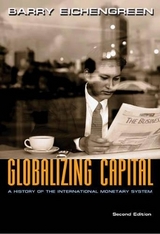
Globalizing Capital
A History of the International Monetary System - New and Updated Edition
Seiten
1996
|
Revised edition
Princeton University Press (Verlag)
978-0-691-02880-4 (ISBN)
Princeton University Press (Verlag)
978-0-691-02880-4 (ISBN)
- Titel erscheint in neuer Auflage
- Artikel merken
Zu diesem Artikel existiert eine Nachauflage
This volume tells the story of the international financial system over the past 150 years. It demonstrates that insights into the International Monetary System and effective principles for governing it can result only if is seen as a historical phenomenon.
The importance of the International Monetary System is evident in the daily news stories about fluctuating currencies and in dramatic events, such as the recent reversals in the Mexican economy. It has become increasingly apparent that one cannot understand the international economy without knowing how its monetary system operates. This volume tells the story of the international financial system over the past 150 years. It is intended not only for economists, but also for a general audience of historians, political scientists, professionals in government and business, and anyone with a broad interest in international economic and political relations. The book demonstrates that insights into the International Monetary System and effective principles for governing it can result only if is seen as a historical phenomenon extending from the gold standard period to interwar instability, then to Bretton Woods and, finally, to the post-1973 period of fluctuating currencies. Eichengreen analyzes the shift from pegged to floating exchange rates in the 1970s, and ascribes that change to the growing capital mobility that has made pegged rates difficult to maintain.
However, he shows that capital mobility was also high prior to World War I, yet this did not prevent the maintenance of fixed exchange rates. What was critical for the successful maintenance of fixed exchange rates during that period was the fact that governments were relatively insulated from democratic politics and, thus, from pressure to trade off exchange rate stability for other goals, such as the reduction of unemployment. Today, pegging exchange rates would require very radical reforms of a sort that governments are understandably reluctant to embrace. The implication seems undeniable: floating rates are here to stay. Barry Eichengreen is the author of "Golder Fetters: The Gold Standard and the Great Depression, 1918-1939".
The importance of the International Monetary System is evident in the daily news stories about fluctuating currencies and in dramatic events, such as the recent reversals in the Mexican economy. It has become increasingly apparent that one cannot understand the international economy without knowing how its monetary system operates. This volume tells the story of the international financial system over the past 150 years. It is intended not only for economists, but also for a general audience of historians, political scientists, professionals in government and business, and anyone with a broad interest in international economic and political relations. The book demonstrates that insights into the International Monetary System and effective principles for governing it can result only if is seen as a historical phenomenon extending from the gold standard period to interwar instability, then to Bretton Woods and, finally, to the post-1973 period of fluctuating currencies. Eichengreen analyzes the shift from pegged to floating exchange rates in the 1970s, and ascribes that change to the growing capital mobility that has made pegged rates difficult to maintain.
However, he shows that capital mobility was also high prior to World War I, yet this did not prevent the maintenance of fixed exchange rates. What was critical for the successful maintenance of fixed exchange rates during that period was the fact that governments were relatively insulated from democratic politics and, thus, from pressure to trade off exchange rate stability for other goals, such as the reduction of unemployment. Today, pegging exchange rates would require very radical reforms of a sort that governments are understandably reluctant to embrace. The implication seems undeniable: floating rates are here to stay. Barry Eichengreen is the author of "Golder Fetters: The Gold Standard and the Great Depression, 1918-1939".
Barry Eichengreen is the John L. Simpson Professor of Economics and Political Science at the University of California, Berkeley. He is the author of European Monetary Unification: Theory, Practice and Analysis.
| Zusatzinfo | 24 line drawings 6 tables |
|---|---|
| Verlagsort | New Jersey |
| Sprache | englisch |
| Maße | 152 x 229 mm |
| Gewicht | 539 g |
| Themenwelt | Geschichte ► Teilgebiete der Geschichte ► Wirtschaftsgeschichte |
| Wirtschaft ► Volkswirtschaftslehre ► Finanzwissenschaft | |
| Wirtschaft ► Volkswirtschaftslehre ► Makroökonomie | |
| ISBN-10 | 0-691-02880-X / 069102880X |
| ISBN-13 | 978-0-691-02880-4 / 9780691028804 |
| Zustand | Neuware |
| Haben Sie eine Frage zum Produkt? |
Mehr entdecken
aus dem Bereich
aus dem Bereich
die Ukraine, Polen und der Irrweg in der russischen Geschichte
Buch | Hardcover (2023)
C.H.Beck (Verlag)
28,00 €
wie die USA und China um die technologische Vorherrschaft auf der …
Buch | Hardcover (2023)
Rowohlt (Verlag)
30,00 €



